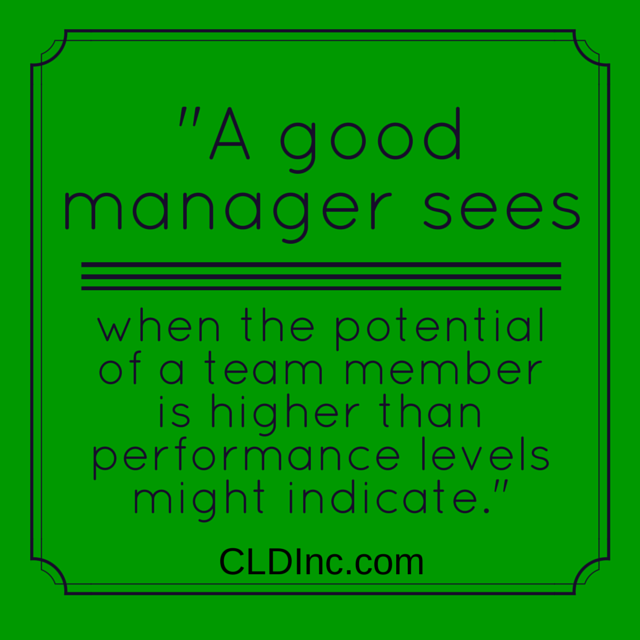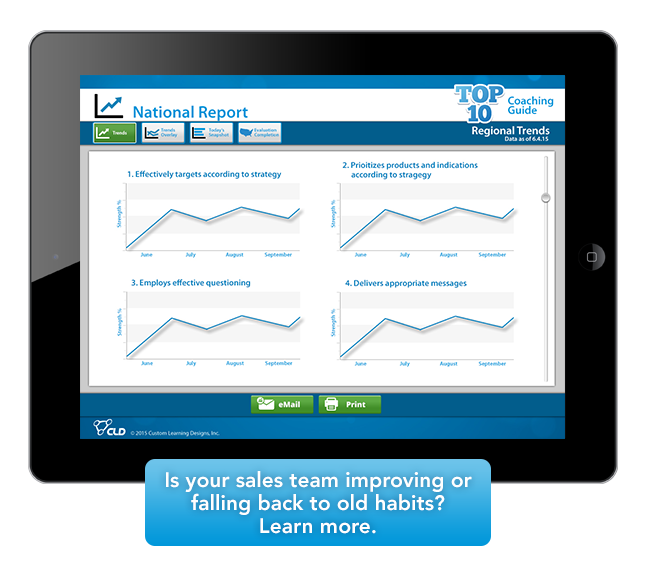Successful managers in today’s knowledge-based economy understand that their team members aren’t just “assets” or “resources” but are three-dimensional people who have the most value when they are allowed to realize their potential. A good manager sees when the potential of a team member is higher than performance levels might indicate and steps into coach this person to help them level up to a higher performance level. Like a great coach, a great manager supports individual players in becoming better at what they do.
People are most motivated at work by making demonstrable progress in a meaningful skill. With pharmaceutical sales training, as with any other work environment, one of the most important things a manager can do is help team members experience the motivating power of making progress in skills that make them better pharmaceutical reps.
How Leaders Interact With Top Performers
A recent study by Steve W. Martin of the University of Southern California Marshall School of Business explored the ways that managers interact with their top performers, and his findings have implications in professional sales training. One important finding was that when interacting with top sales performers, managers collaborate and strategize about potential sales. Managers of underperforming sales professionals were different. Many management interactions with underperforming salespeople consisted not of strategizing or collaborating, but of giving direct instructions and confirming whether daily tasks were being completed.
Listening As a Key Coaching Skill
Listening well is an essential coaching skill. In the highly demanding sphere of pharma sales training, effective listening can make a significant positive difference in sales performance. Listening effectively means focusing intently on what the team member is actually saying rather than what you expect them to say. It can begin with an open-ended question like, “What part of your skill set would you like to improve upon this month?” But it doesn’t stop with asking the question. Great coaching requires listening to what your team member says and helping them come up with a plan of action for fulfilling their goal.
Asking the Right Questions
Sometimes managers have to give direction. Maybe you’re clarifying the steps necessary to complete a task. Or perhaps a team member has asked for direction outright. There’s nothing wrong with this. But coaching often requires asking questions rather than issuing directives. Asking the right questions helps team members articulate their objectives and their challenges and empowers them to develop a plan. Successful sales training requires that sales team members clarify priorities and create strategies that help them fulfil their goals. Asking good questions enables team members to do exactly this.
Coaching to Build Accountability in Pharmaceutical Sales Training
In the Martin study referenced above, 39% of high performing sales professionals agreed that team members are measured against their quota and held accountable. By contrast, only 23% of underperforming sales professionals said this was the case. Building accountability into sales training increases the positive impact of coaching. For example, if a team member wants to partake in a training program, you as a manager can improve its effectiveness by not only helping him or her identify the appropriate program but also by asking for a debriefing after the training is completed. Accountability is one key to maximizing organizational effectiveness of employee development.
The Developmental Alliance at the Heart of Coaching
Coaching is ultimately a successful alliance. As a training manager, there will be times when you need to give your team member the authorization necessary to carry out his or her plan for meeting a work goal. This may involve formal training, or it may involve some other technique, like “shadowing” a top performer for a short period. Afterward, the effective manager follows up, which adds elements of accountability and shows support for the employee’s developmental plan. The result is increasingly effective coaching and a stronger developmental alliance – a virtuous cycle.
CLD, Inc. is acutely aware of the importance of coaching in successful pharmaceutical sales training. Whether you are mentoring new team members or helping experienced reps build their skills, CLD offers performance-focused coaching tools that help you turn pharmaceutical sales training into successful performance in the field. For over 40 years, we have provided clients with customized pharmaceutical sales training solutions that focus on learning, creativity, and technology. If you’d like to find out more, we invite you to check out our free online resources or contact us at any time. We would be delighted to speak with you and answer your questions.


























